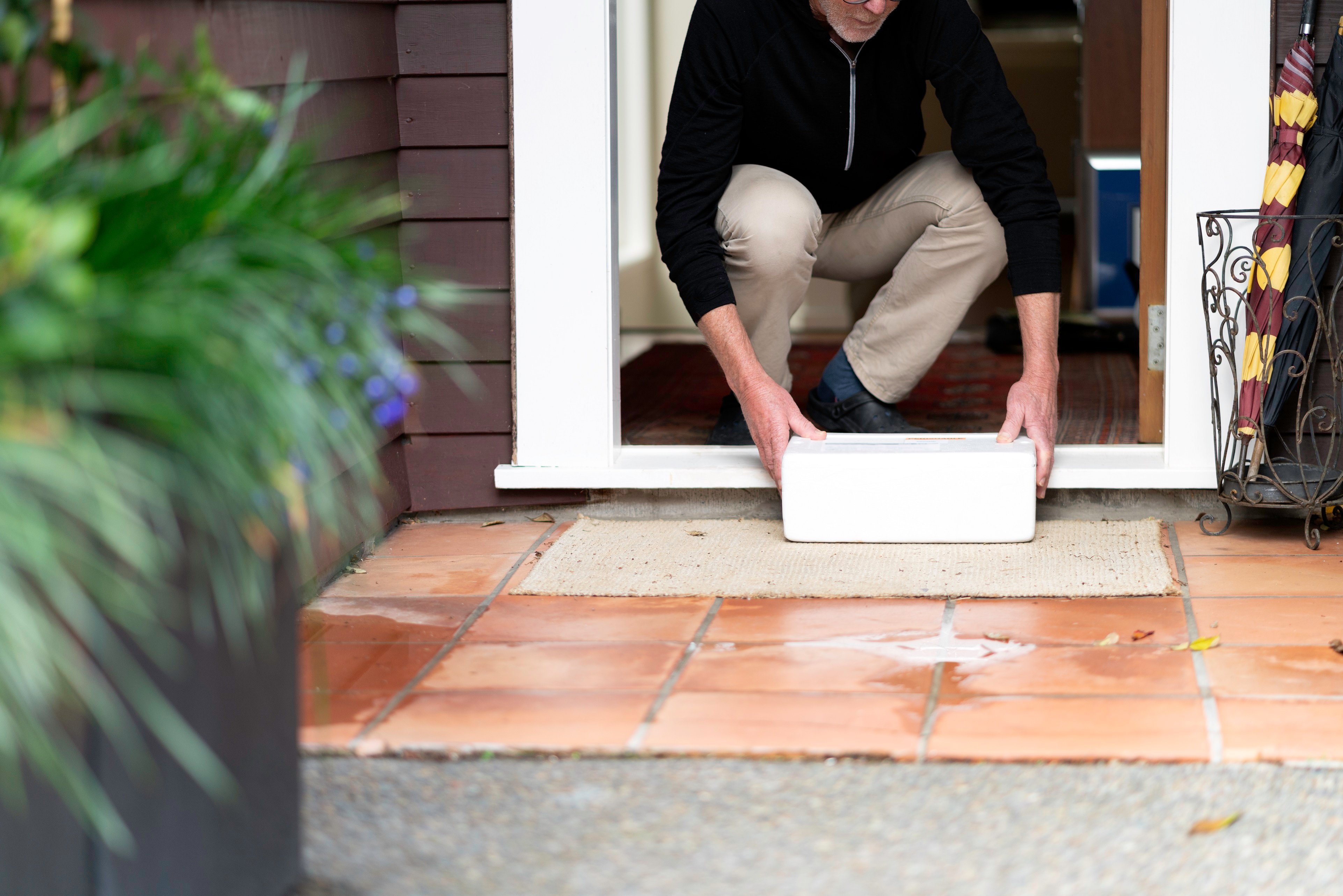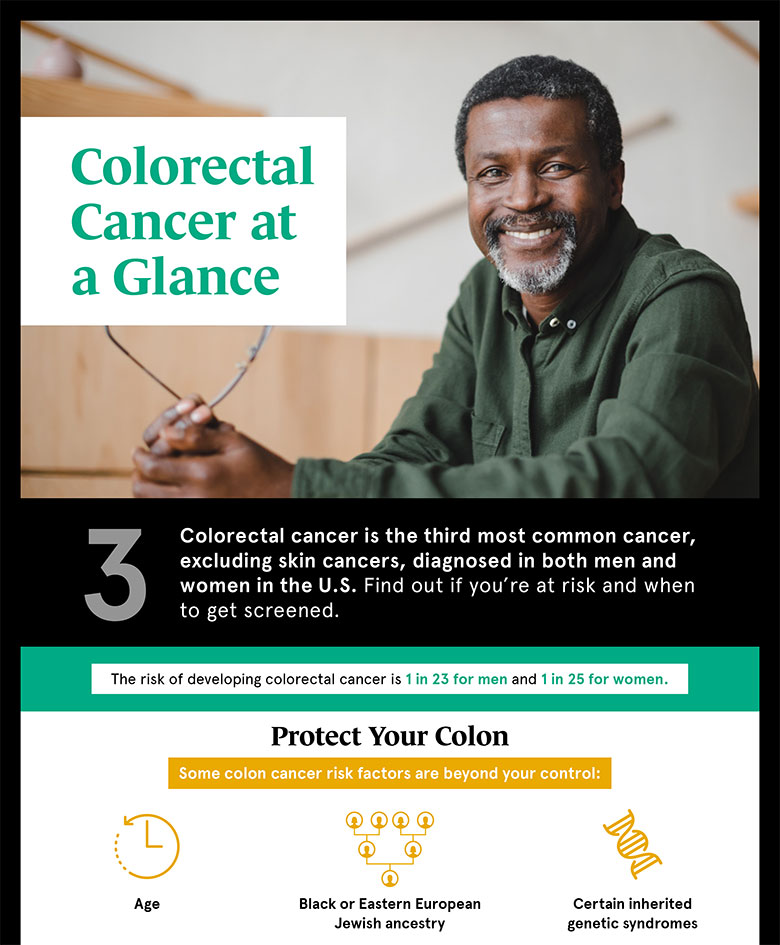Colorectal Cancer Screening Can Save Your Life
Colorectal cancer doesn’t always come with obvious signs and symptoms. That's why screening is so important. Don't avoid it. It could save your life!

Why is Colorectal Cancer Screening so Important?
The short answer is: it can save your life! That's because there are usually no signs that cancer is growing in the colon and rectum when it's in the early stages.
Colorectal cancer screening can find pre-cancerous and cancerous areas when they're very small. This means there are usually fewer treatments needed and the results are highly successful.
It can be an uncomfortable topic but don't avoid it. If you're over 40, stay on top of your health and take the time to schedule an appointment with your primary care physician so you can discuss a colon cancer screening plan that's right for you.
Common Types of Screening for Colorectal Cancers
When it comes to screening there are a few common tests used, ranging from at-home tests to short procedures performed at a healthcare facility. There are pros and cons to both and your doctor will help you choose the one that's right for you based on your age and family history.

Screening at Home

Screening at a Healthcare Facility
Colorectal Cancer Education Center
At-Home Testing for Colorectal Cancer
If you're under 50, your doctor may suggest at-home testing before a colonoscopy or other test performed by a healthcare professional. This allows you to do the test in the comfort of your home without a day of colon preparation before a colonoscopy. It's important to note, however, that these tests can miss many polyps and some cancers.
Stool DNA Test
At-home stool testing has become much more accessible in the last few years. Brands like Cologuard make it easier to conduct a FIT test. This is a Fecal Immunochemical Test and it does not require a day of colon prep before conducting the test.
The kit and all of the instructions are sent to your home at the request of your doctor. You will collect a stool sample and mail it to a lab. The test checks for blood in the stool and gene changes.
Although stool DNA tests are convenient and non-invasive, they are not for everyone. This type of testing should be reserved for only those with an average risk for colon or rectal cancer. If the test results are abnormal, additional testing through colonoscopy may be needed.
Guaiac-based Fecal Occult Blood Test (gFBOT)
Another test that can be prescribed by your doctor and performed at home is the guaiac-based fecal occult blood test (gFBOT). The purposes of this test is to identify blood in the stool that can't be seen by the naked eye. If there are blood vessels at the surface of larger polyps or cancers, they are usually fragile and easily damaged by passing stool. This test can determine if that small amount of blood is present in the stool which can be a sign of polyps. If blood is detected, a colonoscopy will likely be the next step.
After you collect a stool sample onto a test card, you will return it according to the instruction. gFBOT uses a chemical to detect heme, a component of the blood protein hemoglobin. Since this test may detect heme in certain foods and medications, such as red meat, you will most likely be required to eat a special diet prior to screening.

Test Your Knowledge About Colorectal Cancer
Take QuizColorectal Cancer Screening Performed at a Healthcare Facility
Most people aren't excited about their next colonoscopy, but they know it's important and needs to be done. It requires a full day of "prep time" to clean your colon for the doctor to see inside clearly plus the actual procedure the next day.
But these are the most accurate and helpful of the colorectal cancer screenings and can allow the doctor to remove any polyps that may be suspicious. Your doctor will talk with you about which one of the following on-site tests is the best one for you:
Standard Colonoscopy
During a standard colonoscopy, a flexible lighted tube called a colonoscope is used. Inserted into the rectum, the colonoscope features a lens for viewing and a tool for removing tissue. Air is inserted into the rectum, helping doctors to better view the colon lining. If any abnormal growths are identified, they can be removed for testing during this procedure.
A thorough cleansing of your colon prior to testing as well as being sedated during the test are two important steps that help contribute to a successful colonoscopy. According to the National Cancer Institute, studies show that colonoscopy screening can reduce colorectal cancer deaths as much as 60-70%. Because of this, colonoscopy is often the preferred screening test for early detection. A key benefit of a colonoscopy is the ability to view the entire colon.
Virtual Colonoscopy
With a virtual colonoscopy (or CT colonography) test, a CT scanner takes images of your colon. This test typically does not require sedation, however, it does require bowel preparation. During the test, air is pumped into your colon and rectum, which makes it possible for the scanner to show detailed, cross-sectional images. If the doctor sees polyps or possible cancer, a standard colonoscopy may be ordered for confirmation.
If you are at average risk for colon cancer and are age 50 and older, then you are an ideal candidate for a virtual colonoscopy. A doctor may also order a virtual colonoscopy if there is a bowel obstruction or you are at risk for complications from a regular colonoscopy.
Flexible Sigmoidoscopy
Related Reading

What to Know About At-Home Colon Cancer Tests

Colonoscopies: If Mark Can Do It, So Can You

When Should You Start Colon Cancer Screenings?
When to Get Screened for Colorectal Cancer
Recently, the American Cancer Society (ACS) lowered the recommended screening age from 50 to 45 for colon and rectal cancer. This new recommended age resulted from research that found increasing cases of this type of cancer among younger adults. Research remains ongoing, however, several contributing factors attributed to the increase are poor diets, lack of physical activity, and obesity.
In general, screening recommendations for colon and rectal cancer differ based upon whether you are at average risk or high risk for the disease. Patients who are at average risk tend to have no family history of colorectal cancer and are, on average, fairly healthy. The ACS recommends average-risk patients undergo a thorough screening every ten years.
If you are considered at high risk for colorectal cancer it is likely that you have one or more of the contributing factors:
- A family history of colon or rectal cancer
- Problems with inflammatory disease
- Radiation to the pelvic area from a previous cancer
If you fall into the high-risk category, the ACS recommends beginning screening earlier than age 45 and scheduling screenings more frequently than every 10 years. Prevention is key and especially important for those at high risk of developing colon or rectal cancer.
Age 21
Age 45-75
Age 76-85
Age 86 and Over
Understanding Risk Factors for Colorectal Cancer
As with all cancers, there are certain things that put you at risk for developing colorectal cancer — some of which can be controlled, and some that cannot.
And, because there’s no concrete way to know if or when colorectal cancer will develop, it’s highly important to learn more about what those risks are so you can take measures to reduce the likelihood of getting the disease.
When Test Results Come Back Abnormal
Before a doctor can diagnose colon or rectal cancer, further testing is often required. When any test other than a colonoscopy indicates abnormalities, a doctor may order a colonoscopy in order to view the colon in its entirety.
If pathology testing of polyps removed during a colonoscopy returns a cancer diagnosis, your doctor will work to stage the cancer. Discovering whether the cancer has spread helps a doctor to determine the stage.
It is important to remember that not all polyps are cancer. Before jumping to conclusions, wait to hear from your doctor. Download our free guide for newly diagnosed colorectal cancer patients.
Rocky Mountain Cancer Centers is Here to Help
If cancer treatment is needed, RMCC is here to help. Our colorectal cancer specialists throughout Colorado are available for an appointment at a location near you.


